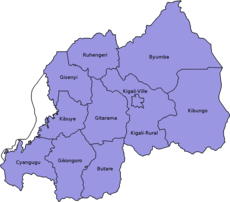United Nations Security Council Resolution 872
United Nations resolution adopted in 1993 From Wikipedia, the free encyclopedia
United Nations resolution adopted in 1993 From Wikipedia, the free encyclopedia
United Nations Security Council resolution 872, adopted unanimously on 5 October 1993, after reaffirming resolutions 812 (1993) and 846 (1993) on the situation in Rwanda and Resolution 868 (1993) on the security of United Nations operations, the council stressed the need for an international force in the country and therefore established the United Nations Assistance Mission for Rwanda (UNAMIR).[1]
| UN Security Council Resolution 872 | ||
|---|---|---|
 Prefectures of Rwanda in 1993 | ||
| Date | 5 October 1993 | |
| Meeting no. | 3,288 | |
| Code | S/RES/872 (Document) | |
| Subject | The situation in Rwanda | |
Voting summary |
| |
| Result | Adopted | |
| Security Council composition | ||
Permanent members | ||
Non-permanent members | ||
| ||
The signing of the Arusha Accords was welcomed and thanks were given for the efforts of the Organisation of African Unity (OAU) and Tanzania in this respect. The conclusion of the Secretary-General Boutros Boutros-Ghali was that the full cooperation of the parties with one another is essential for the United Nations to carry out its mandate. In this regard, a peace-keeping operation named UNAMIR was established for a period of six months subject to the proviso that it would be extended beyond the initial ninety days upon a review by the council as to whether progress had been made towards the implementation of the Arusha Accords. The Security Council then decided that UNAMIR should have the following mandate:[2]
United Nations Observer Mission Uganda–Rwanda would be integrated into UNAMIR, and the council further approved Boutros-Ghali's decision stating that the deployment and withdrawal of UNAMIR should be carried out in stages, and in this connection, that UNAMIR's mandate, if extended, would be expected to terminate following national elections and the installation of a new government in Rwanda, scheduled to occur by October 1995. The secretary-general was authorised to deploy the first contingent of 2,548 troops to Kigali for an initial period of six months, allowing it to establish transitional institutions and implement other provisions of the Arusha Peace Agreement.[3]
There he was also asked to report on the progress of UNAMIR and the requirements for its further scale and composition. It also asked him to keep the maximum strength of the mission as low as possible, for example, through a phased deployment, and planning cuts had to be considered. The Secretary-General's intention to appoint a Special Representative who would be leading the mission was welcomed. The security council asked him an agreement on the status of the transaction to close within the 30 days was to take effect.
Finally, the resolution called upon the parties to guarantee the safety of United Nations personnel and for member states, specialised agencies and non-governmental organisations to contribute economic, financial and humanitarian assistance for the people and to the democratisation of Rwanda.
Seamless Wikipedia browsing. On steroids.
Every time you click a link to Wikipedia, Wiktionary or Wikiquote in your browser's search results, it will show the modern Wikiwand interface.
Wikiwand extension is a five stars, simple, with minimum permission required to keep your browsing private, safe and transparent.